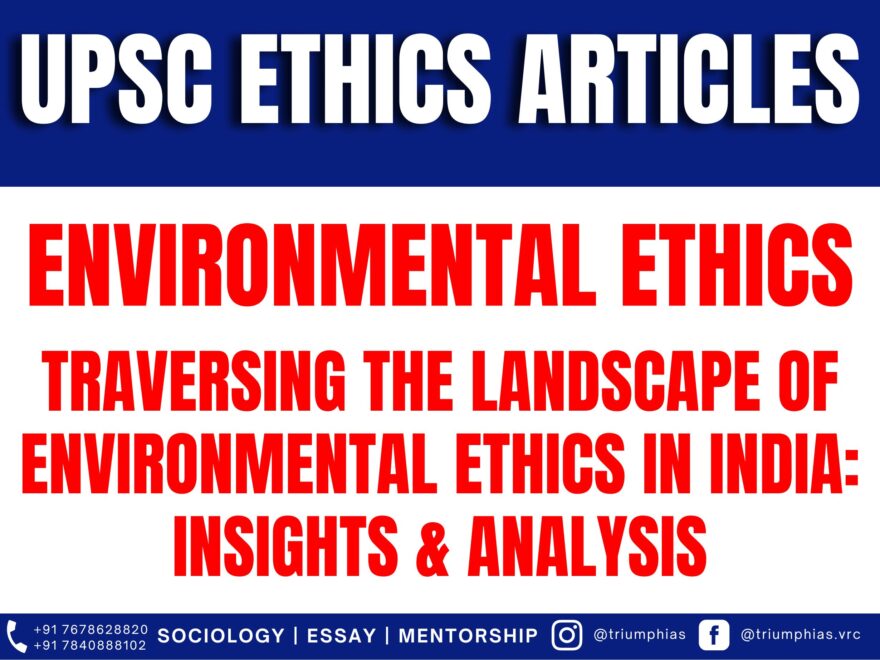An Insight into Environmental Ethics

The term “Environmental Ethics” germinated in the United States during the early eighties and bifurcates into two distinct uses. Predominantly, it represents a social movement striving towards equitable distribution of environmental boons and burdens. Alternatively, it encompasses an interdisciplinary corpus of social science literature, scrutinizing theories on environmental justice, environmental laws, their enactment, environmental policy, planning, sustainable development governance, and political ecology.
Humans routinely face various ethical decisions regarding the environment. As an instance, one can cite the Supreme Court’s October 2018 judgment mandating only Green Crackers’ use and confining their ignition to a two-hour window during Diwali. This verdict, however, spurs other ethical debates including worries about its secular nature and its implications on employment prospects in cracker manufacturing factories.
Another avenue to probe is the stringent timeframe imposed by the Supreme Court. Traditional cracker manufacturing units find it impracticable to transform into Green units right before Diwali, especially when the crackers are already retailed to wholesalers and customers. Furthermore, the assumption that Green Crackers are less harmful than conventional ones requires investigation.
Ethical dilemmas extend to numerous other situations:
• Is the rampant deforestation in the name of human consumption justified?
• What rationalizes our relentless propagation of human species and life?
• Should we continue manufacturing gasoline-powered vehicles?
• What environmental responsibilities should we uphold for future generations’ welfare?
• Is it ethically right to intentionally cause a species’ extinction for human convenience?
• How should we efficiently use and conserve the space environment to ensure life’s sustainability and advancement?
These queries carry immense significance globally and notably in India, which unfortunately holds the highest number of environmental conflicts, as reported by the Environmental Justice Atlas, an international database, with 271 documented cases.
These conflicts often reveal a tight nexus between business and political interests, abetted by a complacent administration. For instance, multiple Coca-Cola bottling plants operate amidst widespread resistance from local communities across diverse locations. The global soda giant has faced continuous allegations of exploiting local water resources, draining groundwater levels, and polluting the soil. While some plants have been closed due to severe protests, many continue to function without taking substantial measures to mitigate the environmental damage caused.
The majority of these conflicts are misperceived as a clash between development and the environment. It’s vital to understand that economic prosperity doesn’t inevitably result in environmental degradation. Several opinion leaders audaciously contend that these conflicts obstruct the ease of doing business in the country. Such narrow viewpoints disregard the fact that business growth and industrialization should enhance the lives of the citizens and not compromise their happiness and well-being by damaging their natural surroundings.
India has attempted to tackle environmental concerns by formulating stricter laws to conserve natural resources, limit industrialization’s environmental impact, and compensate those affected by so-called development. Yet, it remains a harsh reality that lawmaking in India often generates loopholes allowing authorities and businesses to defy regulations and sometimes evade punishments for severe offenses.
This stark reality is evident from India’s ranking of 177 out of 180 nations on the Environmental Performance Index 2018, significantly declining from 141 in 2016. The country’s environmental health ranks low, and it has the third-worst air quality globally.
Despite the rich tapestry of laws, environmental governance in India is found lacking due to their dismal implementation. This ineffectiveness originates from a framework devoid of meaningful public participation. Eminent experts such as A. Damodaran from the Indian Institute of Science have consistently advocated for a multi-layered environmental governance system reliant on locally formulated and implemented plans. These combine conservation objectives with sustainable development, challenging the traditional one-size-fits-all approach directed by centrally designed regulations.
As environmental governance struggles, the judiciary has intervened. Courts have frequently championed environmental causes and demonstrated greater sympathy toward community concerns compared to the administration. However, their task is formidable. In 2016 alone, 21,145 pending environmental cases awaited trial.
The demand for an end to the mass murder of environmental protectors is evident from public opinion. Only when environmental justice is effectively delivered, will we see a change. If you’re studying these and other important issues for the Sociology Optional Syllabus, consider seeking help from the Best Sociology Optional Teacher or enrolling in the Best Sociology Optional Coaching for comprehensive guidance.
Tags: Environmental Ethics, Environmental Justice, Green Crackers, Environmental Performance Index, Indian Environmental Conflicts, Environmental Governance in India, Environmental Law in India, Sustainable Development, Environmental Concerns, Best Sociology Optional Teacher, Best Sociology Optional Coaching, Sociology Optional Syllabus

